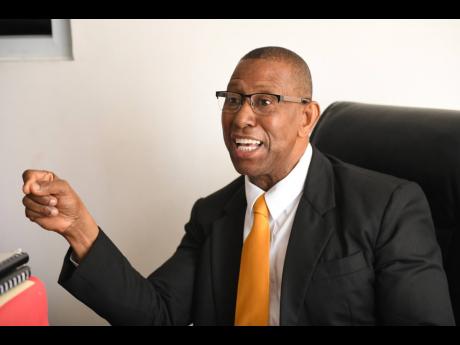Defence cries foul as DPP moves Armstrong case to Home Circuit Court
The defence team representing Anthony Armstrong is contemplating challenging the decision by the Office of Director of Public Prosecutions (ODPP) to transfer the fraud case against him to the Home Circuit Court.
Hugh Wildman, who is leading the defence team which includes Jacqueline Samuels-Brown, KC; attorney-at-law Althea Grant; and Linda Wright, told The Gleaner on Thursday that they are considering taking the matter for a judicial review as they believe the ODPP was wrong in principle to have transferred the matter.
Armstrong, who is a Jamaican lawyer and Antigua’s director of public prosecutions, was arrested and slapped with several fraud-related charges last November following allegations that he sold three properties belonging to a former client without permission some 18 years ago.
The matter was at the committal hearing stage in the Kingston and St Andrew Parish Court, where Wildman was scheduled to make submissions on Thursday for the case to be thrown out. This after the judge had ruled against an earlier application to end the matter for abuse of process.
However, the matter did not proceed as planned, as the director of prosecutions entered a nolle prosequi for the matter to be discontinued in the parish court and to restart in the high court on a voluntary bill of indictment.
The case against Armstrong and his co-accused, Shelly- Ann Peart Campbell, who is the cousin of the complainant, was then transferred and their bail revoked.
However, their bail were reinstated when they appeared in the high court.
Armstrong was offered $500,000 bail and Peart Campbell, $300,000.
They are to return to court on March 22.
PEEVED
An obviously peeved Wildman, in registering his displeasure, accused the ODPP of not only grandstanding but undermining the Committal Proceedings Act and perpetuating the abuse of the process against his client.
He also accused the office of depriving his client of his right to have a committal hearing.
“Judicial review proceedings are now developed, where the exercise of the powers of the DPP are subject to judicial review, and I’m quite sure this is one occasion where it could be ... .
“He has a legitimate expectation that he will be afforded the protection of a committal proceeding law, and he’s been deprived of that. So we think that this is justifiable action, if we choose to go that route, to challenge by way of judicial review,” he said.
Wildman, who mentioned that he was only notified of the new development the night before, said the process taken was highly arbitrary and discourteous and that it had left his client to suffer the indignity of being taken into custody to be transported downtown.
“There was no need for this. If the DPP’s office thinks that the clerk cannot manage the submission, let her come up here and respond to it, let the Crown counsel come and respond to it or ask for a new date.
“But you don’t do that you take this draconian step of sending it down to the Supreme Court,” Wildman argued.
He insisted that the process was designed to embarrass his client and should not have been done.
But in response, a representative from the ODPP said a request was made by the clerk and a decision was made late in the evening and the defence lawyers were immediately notified.
He said there was no calculated attempt to embarrass or inconvenience counsel and the decision to transfer the matter was fairly considered and in the interest of both parties.
Armstrong was arrested last November on his arrival at the Norman Manley International Airport and later slapped with conspiracy and fraudulent conversion, forgery and uttering charges.
The complainant in the matter had also reported Armstrong to the General Legal Council, whose Disciplinary Committee found that Armstrong was guilty of professional misconduct for signing a document for a client who was not present.
Armstrong is contending that he is not guilty of the charges because the proceeds of the sale were paid over to the complainant’s father, who he had authorised to be his agent while he was incarcerated in the United States.

